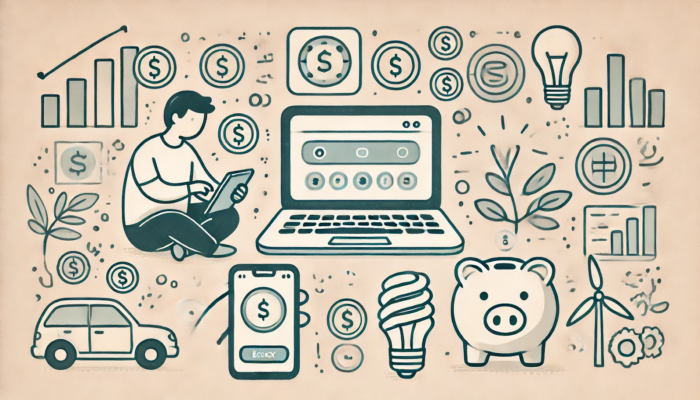Many Americans today face rising living costs while trying to maintain financial stability. Balancing everyday expenses with savings goals has become increasingly difficult, and traditional saving methods may no longer be sufficient to meet these growing financial pressures.
As a result, people are seeking innovative ways to not only cut costs but also boost their income. From side hustles to smarter spending habits, there are many avenues to explore when working toward financial wellness.
Smart Ways to Cut Expenses Without Sacrificing Quality
Cutting expenses doesn’t have to mean giving up on comfort or the things you enjoy. With a few practical adjustments, it’s possible to save money without a noticeable impact on your lifestyle:
- Audit Your Subscriptions: Review recurring payments such as streaming services, gym memberships, or magazine subscriptions. Often, people pay for services they rarely use. Canceling these unused subscriptions can result in quick savings.
- Make Smarter Purchases: Use price comparison tools or apps to find the best deals on everyday items. Shopping during sales or utilizing cashback programs can further reduce costs on essentials without compromising on quality.
- Adopt Energy-Saving Habits: Simple changes like turning off lights when not in use, switching to energy-efficient appliances, and using smart thermostats can lower your utility bills without much effort.
- Cut Back on Dining Out: Cooking at home is often significantly cheaper than eating out. Meal prepping in advance can also help reduce the temptation for last-minute takeout, saving both time and money.
- Use Public Transportation or Carpool: Reducing fuel and vehicle maintenance costs is possible by using public transportation or organizing carpools. This not only saves money but can also prolong the life of your vehicle.
These small changes can free up additional funds for other financial goals or even for occasional leisure activities, such as playing at an online casino as a fun side pursuit.
Diversifying Income with Popular Side Hustles
In addition to smarter spending, many Americans are turning to side hustles to supplement their income. In 2023, nearly 44% of U.S. adults reported having a side job, contributing an average of $483 per month to their earnings. Some of the most popular side hustle options include:
- Freelance Work: Freelance jobs such as writing, graphic design, and digital marketing offer flexibility. Platforms like Upwork and Fiverr connect freelancers with clients, with earning potential ranging from $20 to $100 per hou, depending on skill level.
- Ride-Sharing and Delivery Services: Companies like Uber, Lyft, and DoorDash allow individuals to earn money using their vehicles. Earnings can range from $15 to $25 per hour, with higher rates during peak times.
- Online Tutoring: Online tutoring platforms like VIPKid and Chegg provide opportunities for those with teaching experience or expertise in specific subjects. Tutors typically earn between $14 and $22 per hour.
- Selling Products Online: Many entrepreneurs are turning to e-commerce, selling products through platforms like Etsy or eBay. Depending on the effort and demand, sellers can make around $1,000 per month.
These side hustles offer flexible, reliable ways to boost your income without needing to commit to a full-time second job. Each one allows you to earn money on your schedule, making it easier to balance work with daily responsibilities.
Exploring New Avenues for Financial Gains
Beyond traditional side hustles, some individuals are looking at other, less conventional opportunities to increase their income. Among these, online casinos are growing in popularity as a form of entertainment with potential financial rewards. In 2022, the global online gambling market, including online casinos, betting and lotteries, was valued at over $59 billion and is expected to continue growing.
While some view online casinos as pure entertainment, others see them as a way to earn extra income through bonuses and promotions occasionally. For instance, online casino welcome bonuses can increase initial deposits, providing more funds to play with. However, the risks associated with online gambling mean it should be approached cautiously.
As casino expert Clarissa Kane from nodeposit.org, an online casino platform, points out, “Gambling should be treated as a hobby, not a steady income source. While occasional wins are possible, responsible play is crucial for keeping it enjoyable.”
Though online casinos may offer some opportunities for small gains, like casino bonuses and promotions, they are only one piece of a broader strategy for managing finances and should not be relied upon for regular income.
Conclusion
Achieving financial stability in today’s economy requires both smarter spending and new ways to generate income. By cutting unnecessary expenses and adopting cost-saving habits, individuals can improve their financial situation without sacrificing their quality of life.
Side hustles like freelancing, tutoring, and selling products online offer flexible ways to earn extra money, while more unconventional options, like online casinos, may add an occasional boost, but should be approached cautiously.
A balanced approach to managing finances—through careful spending, smart saving, and supplemental income—provides a stronger foundation for financial well-being in the future.






